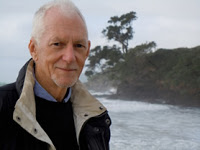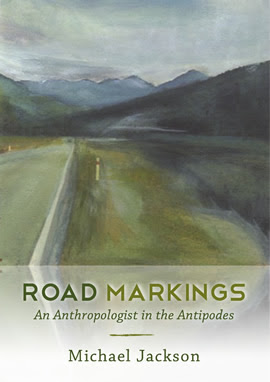Michael Jackson is best known in his native New Zealand for his poetry (his seventh collection, Being of Two Minds, has recently been published by Steele Roberts, Wellington), though he is internationally renowned as an ethnographer, having done fieldwork in Sierra Leone, West Africa, and in Aboriginal Australia (among the Warlpiri of the Tanami Desert and Kuku-Yalanji speaking people on Cape York) over a forty year period.
He has taught anthropology at Massey University, Victoria University of Wellington, the University of Sydney, the Australian National University, Indiana University, the University of Copenhagen, and is currently a Distinguished Visiting Professor of World Religions at Harvard Divinity School. He is the author of 27 books of poetry, fiction, memoir, and ethnography.
Michael’s poem Hit and Run was my Tuesday Poem this week.
Michael, would it be fair to call Road Markings an anthropological memoir?
There are elements of memoir in it, but I think of it more as a road book – a journey in present time, focused on conversations with people in the here and now, but with inevitable digressions into the past.
Can you explain the concept of ‘firstness’ as it refers in Road Markings, and why is it so important both to the book and to you?
The book’s perspective is that of an expatriate who, despite having remained faithful to his natal country and returned home every year like a migratory bird, has never ceased wondering what kind of life he might have led had he stayed put. Inevitably, this leads to the question of whether the way New Zealand shaped me as a child still determines the way I think and the way I see the world. In my case, New Zealand has never ceased to haunt me. Much as I have needed radically different places to enlarge my horizons, to challenge me as a person and as a writer, I have needed to sustain a relationship with the place that first nurtured me.
Yet every expatriate knows the dilemma of trying to keep the home fires burning, yet watching them gutter and gradually go out. There is a Maori saying that for as long as you live on the land, a fire burns there (ahi ka), signaling that you have the right to be there. But if you abandon the land, the fires die (ahi mataotao) and you forfeit that right. As we say, occupation is nine tenths of the law. In 2008 I decided that the time had come for me to explore this quandary in more depth, so I hired a car, and hit the road, determined to engage these issues through conversations with old friends and visits to old haunts.
Road Markings emerged as a series of meditations on the power of first experiences in our lives – first love, first landfall, first home, first loss. It touches on the ways that personal stories are interwoven with social and historical events, and explores Maori invocations of toi whenua in making claims for recognition and social justice, the search of adopted children for their birth parents, the notion of childhood as ‘the formative years’, our current preoccupation with genealogical, geographical or genetic backgrounds, and the allure of myths and models of cause and effect.
Road Markings is structured around a series of meetings with old friends, meaning that their narratives are intertwined with yours in the book. Did you encounter any resistance, or feel any constraint, in including their stories and experiences in this book?
Most people I spoke to agreed to have our conversations included in the book, though there were several instances when sensitive or potentially compromising material was edited out. In a couple of cases, names were changed to protect the identity of my interlocutors.
I don’t think I’d call Road Markings a particularly happy book. Many of the life stories you recount are filled with sadness and loss. Would you describe your return to New Zealand, as described in the book, as a happy one on the whole? Are you glad you made the journey?
All my returns home have been happy. But no human life is without its moments of sadness and loss. What struck me constantly as I made this particular journey was the resilience of the people I spoke to, the creative ways in which they had responded to adversity, and the good humour with which they embraced twists of fate and reverses of fortune. True happiness comes not from avoiding the hardships of life but knowing how to affirm life in even the hardest times. This has been borne home to me in every place I have done ethnographic fieldwork, whether in Africa, Aboriginal Australia or Aotearoa New Zealand.
A question that may be related: Do you regret spending so many years of your life away from New Zealand?
I regret nothing. But as I said before, there are dilemmas in life one cannot really resolve – such as maintaining relationships with all the places and people one has met in the course of an itinerant life. The question is how to accept, rather than regret.
One of your chapters, “Distance looks our way”, takes its title from Charles Brasch’s 1948 poem “The Islands”:
Everywhere in light and calm murmuring
Shadow of departure; distance looks our way
And none knows where he will lie down at night.
Brasch was writing during the period in which some New Zealand writers – opposed to a greater or lesser degree by others – developed a (predominantly white, predominantly masculine) New Zealand literary nationalism, and Road Markings revisits both these debates over national identity and the challenging of that constructed identity by Maori and feminists from the 1970s onwards. How important do you think this debate over national identity continues to be in the New Zealand of the 2010s?
Questions of identity – personal, ethnic, national, literary, gendered – have never been of much concern to me. My anthropological work has been far more oriented toward the ways in which identities can be negotiated, blurred, disregarded or transcended, and how it is possible, as a person or an ethnographer, to cross boundaries and develop meaningful relationships with people who, on the face of it, have nothing in common with oneself. I have always striven to realise the truth of Terence’s famous dictum: nothing human is alien to me.
Road Markings is an ebook. Is this your first venture into being published in this format, and how have you found it?
Had I not placed my manuscript in the capable hands of Penelope Todd, who also edited the manuscript of my memoir (The Accidental Anthropologist), I might have found e-publishing less satisfying than traditional publication. And though this is my first e-book, I’m gratified to say that word is getting around, and my fears that the book would disappear like a stone dropped into the sea have been allayed.
Road Markings has received good reviews in New Zealand. Have your friends and colleagues overseas read the book, and if so, how have they reacted?
A lot of my students have read the book, and like it. It helps them see where I am coming from. It helps them understand some of my un-American traits, for which I have my New Zealand upbringing to thank – my aversion to hierarchy and formality, my insistence on being called by my first name, my egalitarianism, my naïve curiosity, and a veneer of rustic innocence that, I am happy to say, has never worn off.
How To Buy Road Markings
Road Markings can be purchased from Rosamirabooks.com. It is available in epub, PDF and Kindle formats, meaning that it can be read on most mobile devices, on a PC or Mac, and on a Kindle.



